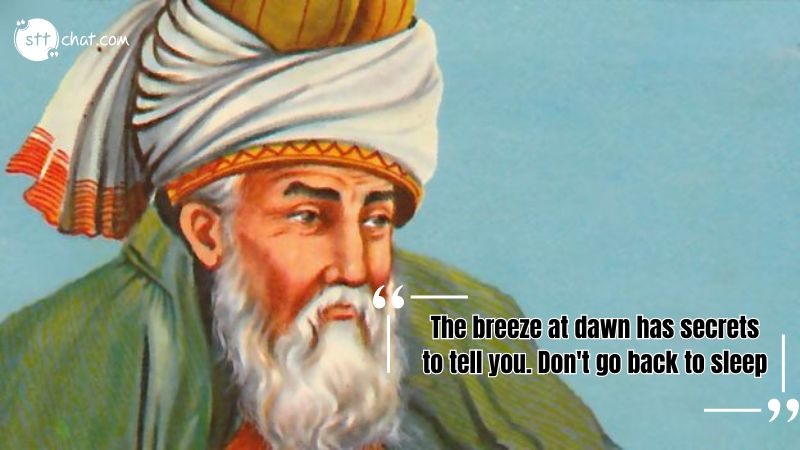The pre-dawn hush holds a certain magic. The world is still, the air crisp, and a sense of anticipation hangs heavy. It's in this liminal space that Rumi, the 13th-century Persian poet, beckons us with his evocative verse: "The breeze at dawn has secrets to tell you. Don't go back to sleep." These words are more than just a call to rise early; they're an invitation to awaken to the hidden potential within ourselves and the world around us.The breeze at dawn has secrets to tell you. Don't go back to sleep.
-Rumi-
The breeze at dawn has secrets to tell you. Don't go back to sleep meaning
Dawn is a potent symbol in many cultures, representing a fresh start, a time of renewal and rebirth. As darkness surrenders to light, it signifies the vanquishing of ignorance and the illumination of truth. Rumi suggests that this period of transition holds secrets waiting to be discovered. The cool morning breeze, often associated with inspiration and new beginnings, becomes a messenger carrying whispers of wisdom and possibility.

Rumi suggests that this period of transition holds secrets waiting to be discovered - Source: Internet
How to overcome the challenge named of “going back to sleep”
The act of "going back to sleep" in Rumi's quote transcends literal slumber. It represents the tendency to remain complacent, to settle for the familiar, and to ignore the whispers of our intuition. He urges us to resist the inertia of routine and instead actively seek out experiences that challenge and awaken us. This awakening can take many forms – exploring a new creative pursuit, engaging in deep conversations, or simply taking a mindful walk in nature.
The secrets of the dawn: Unveiling hidden potential
What are these secrets that the dawn whispers? They are as unique as the individual. For some, it might be a newfound clarity about a life goal, a burst of creative inspiration, or a deeper understanding of oneself. The dawn can be a time for introspection, for quieting the mental chatter and allowing insights to surface. It can be a space for connection, for experiencing the beauty of the world awakening around us.

Unveiling hidden potential within a dawn - Source: Internet
The power of habit: Cultivating a dawn ritual
Rumi's message isn't a call for forced early mornings if that doesn't suit your natural rhythm. However, intentionally carving out some quiet time before the day unfolds can be transformative. Here are some ways to cultivate a personalized dawn ritual:
Embrace the Quiet: Start your day with a few moments of silence. Breathe deeply, meditate, or simply sit in stillness and allow your thoughts to settle.
Connect with Nature: Step outside and witness the sunrise. Feel the cool air on your skin, listen to the birdsong, and immerse yourself in the beauty of the awakening world.
Journaling: Capture your thoughts and dreams in a journal. This can be a powerful tool for self-reflection and uncovering hidden patterns.
Creative Exploration: Dedicate some time to a creative pursuit, be it writing, painting, playing music, or any activity that allows you to express yourself freely.
Gratitude Practice: Start your day by acknowledging the things you're grateful for. This cultivates a positive mindset and sets the tone for the day ahead.
A lifelong journey of awakening
Rumi's quote is a reminder that the pursuit of awakening is a lifelong journey. It's not about achieving some ultimate state of enlightenment, but rather about cultivating a constant state of curiosity, openness, and growth. By embracing the quietude of the dawn and actively seeking out experiences that challenge and inspire us, we can begin to unveil the secrets that lie within ourselves and the world around us.
So, the next time you hear the pre-dawn whispers, don't hit the snooze button. Instead, rise and meet the day with open eyes and an open heart. You might just discover the magic that awaits.
Conclusion
Reality is that it is difficult to overcome the challenge of “going back to sleep” when waking up the morning. However, this Rumi’s quote teaches that there are many things present when the dawn is coming.






